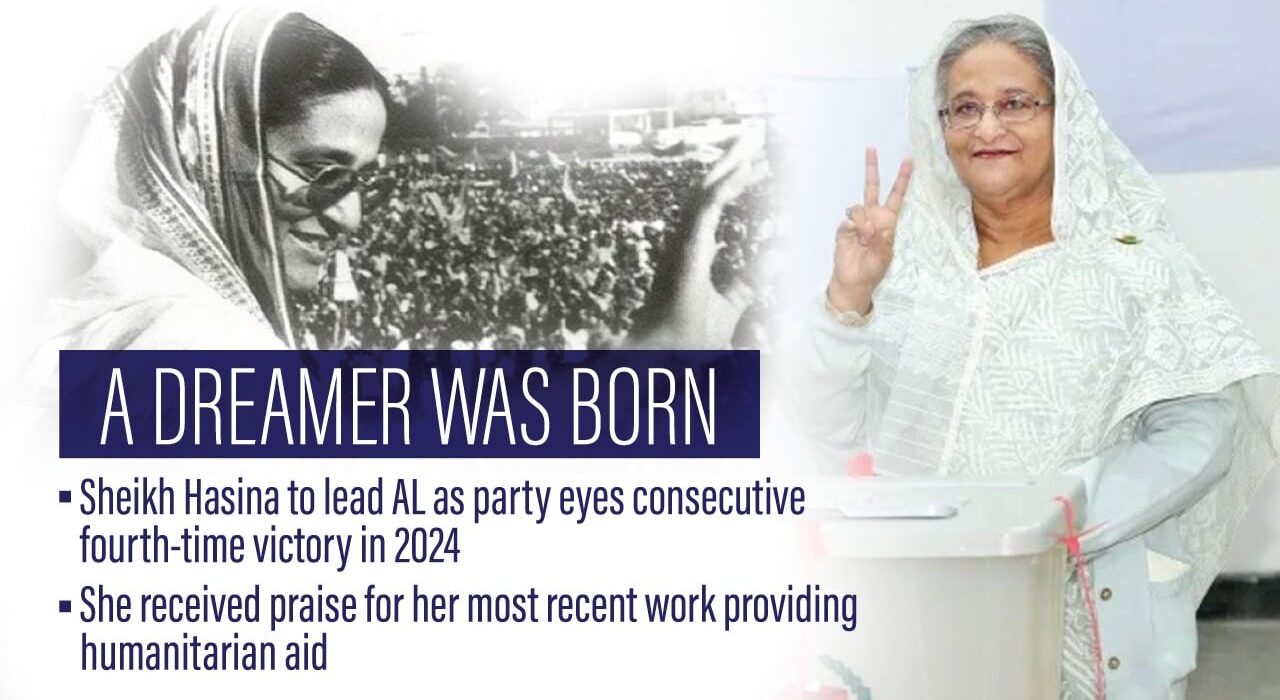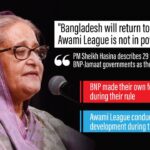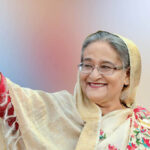Prime Minister and Awami League President Sheikh Hasina, the oldest of the five children of Bangabandhu Sheikh Mujibur Rahman and Bangamata Sheikh Fazilatun Nesa Mujib, was born on September 28, 1947, in Tungipara, Gopalganj.
On Thursday, the nation is celebrating her 76th birthday as the four-time premier is ready to lead the party in the 12th general election as the unparalleled leader. She eyes a consecutive fourth-time victory, amid local and international pressures.
AL and its affiliated bodies and socio-cultural organizations are celebrating the day through various programs highlighting the life and achievements of Sheikh Hasina.
On this occasion, discussions, milad and doa mahfils, special prayers, and boat races will be organized in the capital and across the country.
Sheikh Hasina is currently abroad as she departed the country to attend the 78th United Nations General Assembly and delivered her 19th speech in the UNGA in Bangla following the footprint of Bangabandhu.
Party leaders say Bangladesh has advanced significantly in the areas of women’s empowerment, agriculture, education, health, infrastructure, communication, energy and power, trade and commerce, ICT, and the SME sectors under Sheikh Hasina’s leadership, achieving steady economic growth and becoming a food-self-sufficient nation.
Mega projects including Padma Bridge, Karnaphuli Tunnel, Dhaka Elevated Expressway, Metro Rail, Matarbari Power Plant, Dhaka airport’s third terminal, Rooppur Nuclear Power Plant, Bangabandhu Satellite-1, and many others were initiated under the Sheikh Hasina-led government, the AL leaders highlighted while talking to Dhaka Tribune.
She has also received praise for her most recent work providing humanitarian aid to more than 1.1 million forcefully displaced Rohingya people from Myanmar who sought refuge in Cox’s Bazar from prominent figures, international organizations, and forums.
Sheikh Hasina spent a large part of her youth as well as her initial education in the rural community where she was born. In 1954, after Bangabandhu was chosen as a legislator, the Sheikh family relocated to Dhaka.
Sheikh Hasina was admitted to present-day Sher-e-Bangla Girls’ School and College and later to Azimpur Girls’ High School, where she completed her secondary education in 1965.
She was then admitted to Badrunnessa Government Girls’ College for the higher secondary class.
Sheikh Hasina was chosen to serve as the vice president (VP) of the Eden Mohila College Students’ Union throughout her bachelor program. She then enrolled in the master’s program of Dhaka University’s Bangla department.
She actively engaged in both the historic six-point movement of 1966 and the student movement that resulted in General Ayub Khan’s abdication in 1969 as a student leader.
Sheikh Hasina married nuclear scientist Dr MA Wazed Miah in 1968, with the blessings of her imprisoned father. Her family members were imprisoned at a home in Dhaka during the Liberation War.
Sajeeb Wazed Joy, currently the Bangladeshi PM’s ICT Advisor and her first child, was born on July 27, 1971.
Saima Wazed Putul, who was recently nominated by the government for the post of Regional Director of the World Health Organization’s South-East Asia Region and Sheikh Hasina’s second child, was born on December 9, 1972.
Sheikh Hasina and her family were given political shelter in India following the murder of her parents and other family members in 1975. She remained there until 1981, when she was temporarily elected head of the Awami League.
She returned home on May 17, 1981, and in the 1986 parliamentary election, Sheikh Hasina was elected as a parliament member from three different constituencies.
In 1991, she was chosen as the leader of the opposition in the parliament following the fall of the autocracy in 1990.
She became the prime minister for the first time in the 1996 general elections, 21 years after her father’s murder. AL came into state power with that election.
Later, on August 21, 2004, the then-opposition leader, Sheikh Hasina, narrowly evaded a deadly grenade attack carried out on an Awami League rally at Bangabandhu Avenue in the capital.
In 2008, she led the Grand Alliance to an overwhelming victory, acquiring 90% of parliament seats in the general elections.
She was elected Prime Minister on January 5, 2014, for the second time in a row, and assumed office as Prime Minister for a third consecutive term in December 2018.
Already, several surveys show that 70% of people in Bangladesh want to elect Sheikh Hasina as premier again.
Sheikh Hasina earned the renowned “Vaccine Hero” award in 2019, which was granted in honour of Bangladesh’s exceptional vaccination achievement.
She also played the title role in Rezaur Rahman Khan Piplu’s docudrama “Hasina: A Daughter’s Tale” in 2018.
Over 25 books were written by her. “Mujib Amar Pita,” “Living in Tears,” “Sada Kalo,” and “Amara Janaganer Kotha Bolte Esechhi” are some of her best-known works.






